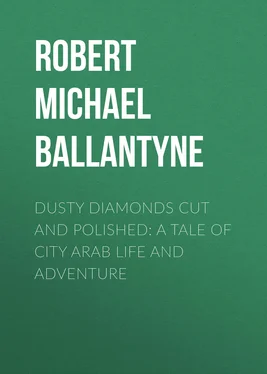Robert Michael Ballantyne - Dusty Diamonds Cut and Polished - A Tale of City Arab Life and Adventure
Здесь есть возможность читать онлайн «Robert Michael Ballantyne - Dusty Diamonds Cut and Polished - A Tale of City Arab Life and Adventure» — ознакомительный отрывок электронной книги совершенно бесплатно, а после прочтения отрывка купить полную версию. В некоторых случаях можно слушать аудио, скачать через торрент в формате fb2 и присутствует краткое содержание. Жанр: Детские приключения, literature_19, foreign_antique, foreign_prose, foreign_children, на английском языке. Описание произведения, (предисловие) а так же отзывы посетителей доступны на портале библиотеки ЛибКат.
- Название:Dusty Diamonds Cut and Polished: A Tale of City Arab Life and Adventure
- Автор:
- Жанр:
- Год:неизвестен
- ISBN:нет данных
- Рейтинг книги:5 / 5. Голосов: 1
-
Избранное:Добавить в избранное
- Отзывы:
-
Ваша оценка:
- 100
- 1
- 2
- 3
- 4
- 5
Dusty Diamonds Cut and Polished: A Tale of City Arab Life and Adventure: краткое содержание, описание и аннотация
Предлагаем к чтению аннотацию, описание, краткое содержание или предисловие (зависит от того, что написал сам автор книги «Dusty Diamonds Cut and Polished: A Tale of City Arab Life and Adventure»). Если вы не нашли необходимую информацию о книге — напишите в комментариях, мы постараемся отыскать её.
Dusty Diamonds Cut and Polished: A Tale of City Arab Life and Adventure — читать онлайн ознакомительный отрывок
Ниже представлен текст книги, разбитый по страницам. Система сохранения места последней прочитанной страницы, позволяет с удобством читать онлайн бесплатно книгу «Dusty Diamonds Cut and Polished: A Tale of City Arab Life and Adventure», без необходимости каждый раз заново искать на чём Вы остановились. Поставьте закладку, и сможете в любой момент перейти на страницу, на которой закончили чтение.
Интервал:
Закладка:
To preserve his goods from the pawnbroker, and prevent a moonlight flitting, this landlord had printed on his sheets the words “stolen from —” and on the blankets and counterpane were stamped the words “stop thief!”
Mrs Frog made no reply to her husband’s gruff question, which induced the man to seize an empty bottle, as being the best way of rousing her attention.
“Come, you let mother alone, dad,” suggested Bobby, “she ain’t a-aggrawatin’ of you just now.”
“Why, mother,” exclaimed Hetty, who was so busy with Bobby’s supper, and, withal, so accustomed to the woman’s looks of hopeless misery that she had failed to observe anything unusual until her attention was thus called to her, “what ever have you done with the baby?”
“Ah—you may well ask that,” growled Ned.
Even the boy seemed to forget his pain for a moment as he now observed, anxiously, that his mother had not the usual bundle on her breast.
“The baby’s gone!” she said, bitterly, still keeping her eyes on the blank wall.
“Gone!—how?—lost? killed? speak, mother,” burst from Hetty and the boy.
“No, only gone to where it will be better cared for than here.”
“Come, explain, old woman,” said Ned, again laying his hand on the bottle.
As Hetty went and took her hand gently, Mrs Frog condescended to explain, but absolutely refused to tell to whose care the baby had been consigned.
“Well—it ain’t a bad riddance, after all,” said the man, as he rose, and, staggering into a corner where another bundle of straw was spread on the floor, flung himself down. Appropriately drawing two of the “stop thief” blankets over him, he went to sleep.
Then Mrs Frog, feeling comparatively sure of quiet for the remainder of the night, drew her stool close to the side of her son, and held such intercourse with him as she seldom had the chance of holding while Bobby was in a state of full health and bodily vigour. Hetty, meanwhile, ministered to them both, for she was one of those dusty diamonds of what may be styled the East-end diggings of London—not so rare, perhaps, as many people may suppose—whose lustre is dimmed and intrinsic value somewhat concealed by the neglect and the moral as well as physical filth by which they are surrounded.
“Of course you’ve paid the ninepence, Hetty?”
“Yes, mother.”
“You might ’ave guessed that,” said Bobby, “for, if she ’adn’t we shouldn’t ’ave bin here.”
“That and the firing and candle, with what the doctor ordered, has used up all I had earned, even though I did some extra work and was paid for it,” said Hetty with a sigh. “But I don’t grudge it, Bobby—I’m only sorry because there’s nothing more coming to me till next week.”
“Meanwhile there is nothing for this week,” said Mrs Frog with a return of the despair, as she looked at her prostrate son, “for all I can manage to earn will barely make up the rent—if it does even that—and father, you know, drinks nearly all he makes. God help us!”
“God will help us,” said Hetty, sitting down on the floor and gently stroking the back of her mother’s hand, “for He sent the trouble, and will hear us when we cry to Him.”
“Pray to Him, then, Hetty, for it’s no use askin’ me to join you. I can’t pray. An’ don’t let your father hear, else he’ll be wild.”
The poor girl bent her head on her knees as she sat, and prayed silently. Her mother and brother, neither of whom had any faith in prayer, remained silent, while her father, breathing stertorously in the corner, slept the sleep of the drunkard.
Chapter Four.
Samuel Twitter astonishes Mrs Twitter and her Friends
In a former chapter we described, to some extent, the person and belongings of a very poor man with five thousand a year. Let us now make the acquaintance of a very rich one with an income of five hundred.
He has already introduced himself to the reader under the name of Samuel Twitter.
On the night of which we write Mrs Twitter happened to have a “few friends” to tea. And let no one suppose that Mrs Twitter’s few friends were to be put off with afternoon tea—that miserable invention of modern times—nor with a sham meal of sweet warm water and thin bread and butter. By no means. We have said that Samuel Twitter was rich, and Mrs Twitter, conscious of her husband’s riches, as well as grateful for them, went in for the substantial and luxurious to an amazing extent.
Unlimited pork sausages and inexhaustible buttered toast, balanced with muffins or crumpets, was her idea of “tea.” The liquid was a secondary point—in one sense—but it was always strong. It was the only strong liquid in fact allowed in the house, for Mr Twitter, Mrs Twitter, and all the little Twitters were members of the Blue Ribbon Army; more or less enthusiastic according to their light and capacity.
The young Twitters descended in a graduated scale from Sammy, the eldest, (about sixteen), down through Molly, and Willie, and Fred, and Lucy, to Alice the so-called “baby”—though she was at that time a remarkably robust baby of four years.
Mrs Twitter’s few friends were aware of her tendencies, and appreciated her hospitality, insomuch that the “few” bade fair to develop by degrees into many.
Well, Mrs Twitter had her few friends to tea, and conviviality was at its height. The subject of conversation was poverty. Mrs Loper, a weak-minded but amiable lady, asserted that a large family with 500 pounds a year was a poor family. Mrs Loper did not know that Mrs Twitter’s income was five hundred, but she suspected it. Mrs Twitter herself carefully avoided giving the slightest hint on the subject.
“Of course,” continued Mrs Loper, “I don’t mean to say that people with five hundred are very poor, you know; indeed it all depends on the family. With six children like you, now, to feed and clothe and educate, and with everything so dear as it is now, I should say that five hundred was poverty.”
“Well, I don’t quite agree with you, Mrs Loper, on that point. To my mind it does not so much depend on the family, as on the notions, and the capacity to manage, in the head of the family. I remember one family just now, whose head was cut off suddenly, I may say in the prime of life. A hundred and fifty a year or thereabouts was the income the widow had to count on, and she was left with five little ones to rear. She trained them well, gave them good educations, made most of their garments with her own hands when they were little, and sent one of her boys to college, yet was noted for the amount of time she spent in visiting the poor, the sick, and the afflicted, for whom she had always a little to spare out of her limited income. Now, if wealth is to be measured by results, I think we may say that that poor lady was rich. She was deeply mourned by a large circle of poor people when she was taken home to the better land. Her small means, having been judiciously invested by a brother, increased a little towards the close of life, but she never was what the world esteems rich.”
Mrs Twitter looked at a very tall man with a dark unhandsome countenance, as if to invite his opinion.
“I quite agree with you,” he said, helping himself to a crumpet, “there are some people with small incomes who seem to be always in funds, just as there are other people with large incomes who are always hard-up. The former are really rich, the latter really poor.”
Having delivered himself of these sentiments somewhat sententiously, Mr Crackaby,—that was his name,—proceeded to consume the crumpet.
There was a general tendency on the part of the other guests to agree with their hostess, but one black sheep in the flock objected. He quite agreed, of course, with the general principle that liberality with small means was beautiful to behold as well as desirable to possess—the liberality, not the small means—and that, on the other hand, riches with a narrow niggardly spirit was abominable, but then—and the black sheep came, usually, to the strongest part of his argument when he said “but then”—it was an uncommonly difficult thing, when everything was up to famine prices, and gold was depreciated in value owing to the gold-fields, and silver was nowhere, and coppers were changed into bronze,—exceedingly difficult to practise liberality and at the same time to make the two ends meet.
Читать дальшеИнтервал:
Закладка:
Похожие книги на «Dusty Diamonds Cut and Polished: A Tale of City Arab Life and Adventure»
Представляем Вашему вниманию похожие книги на «Dusty Diamonds Cut and Polished: A Tale of City Arab Life and Adventure» списком для выбора. Мы отобрали схожую по названию и смыслу литературу в надежде предоставить читателям больше вариантов отыскать новые, интересные, ещё непрочитанные произведения.
Обсуждение, отзывы о книге «Dusty Diamonds Cut and Polished: A Tale of City Arab Life and Adventure» и просто собственные мнения читателей. Оставьте ваши комментарии, напишите, что Вы думаете о произведении, его смысле или главных героях. Укажите что конкретно понравилось, а что нет, и почему Вы так считаете.












